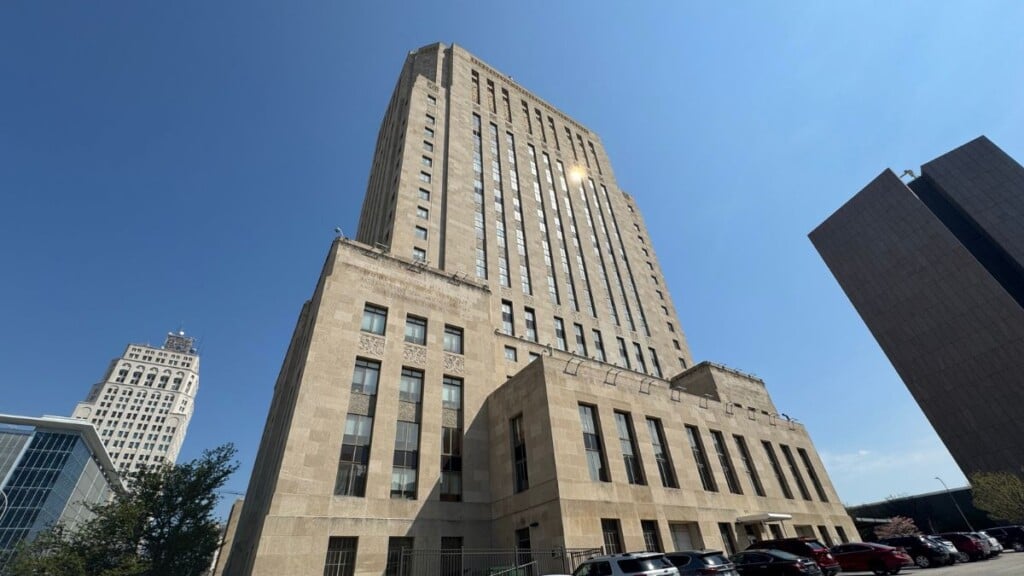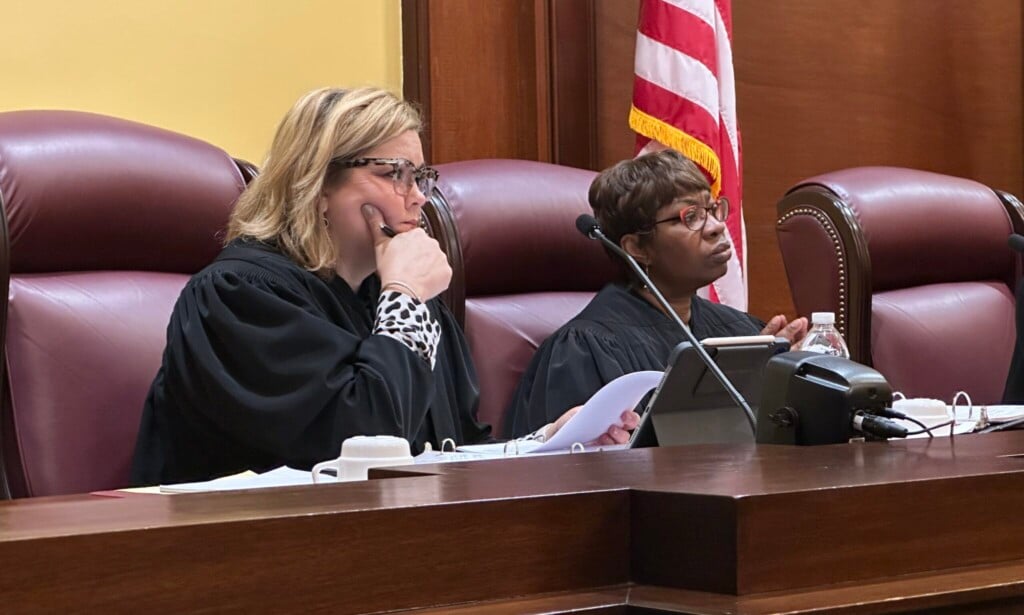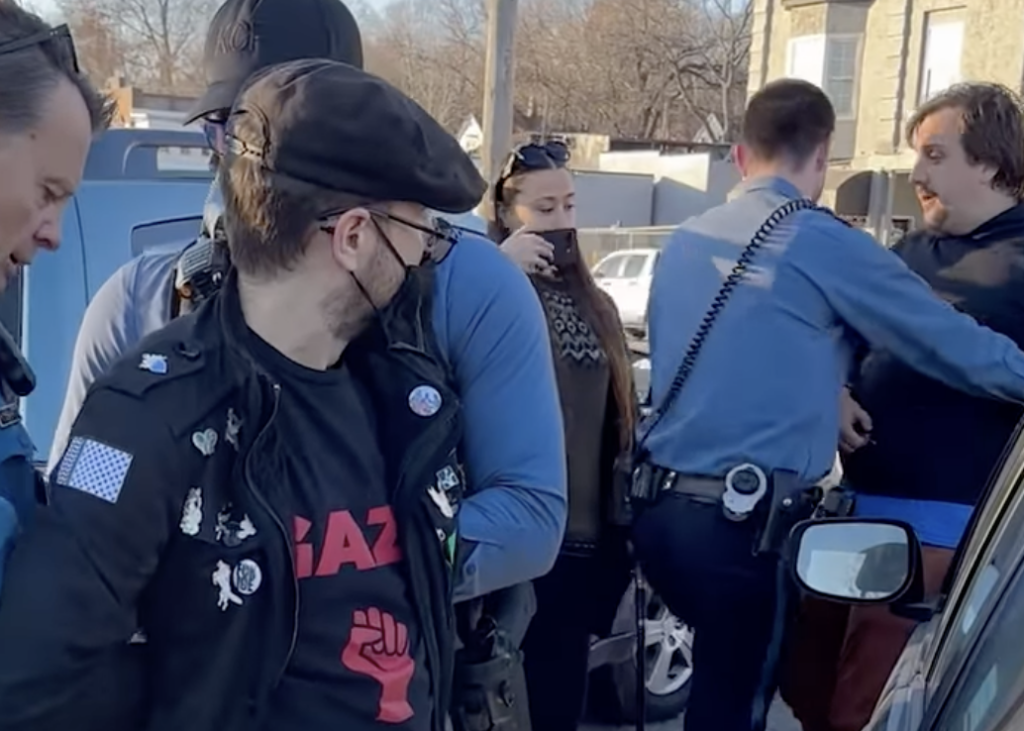Rainy Day Books host White House journalist panel detailing perils, pride in modern media
“Stay engaged, be active about the things you care about, and remain respectful of others," Allen says. “Give each other some grace.”
Last night, more than 75 people gathered at Unity Temple on the Plaza for a conversation centered around the book, Fight: Inside the Wildest Battle for the White House—which was published in early April.
That book is authored by political journalists Jonathan Allen and Amie Parnes, who have spent over 20 years covering politics and contentious issues at the White House. The authors’ book focuses on the embattled Joe Biden, Kamala Harris, and Donald Trump’s during the 2024 election, exploring the challenges each faced.
They came to KC as a stop on their book tour and to have a frank conversation around the process and perils of their job.
The event, hosted by American Public Square (APS) and Rainy Day Books, was moderated by Ebony Reed—a seasoned journalist now serving as the Chief Strategy Officer at The Marshall Project.
The event created a space for open dialogue, allowing community members to ask questions about the book and the challenges of covering the federal government as White House correspondents. In a statement, Reed emphasized the importance of such forums, noting a growing trend that Americans aren’t engaging directly with local journalists.
“Engagement with trained journalists is one of the ways I believe we can address misinformation in our communities,” Reed says.
The event was also held on Terez Paylor Day, in commemoration of beloved Kansas City journalist Terez Paylor, who passed away four years ago and was Reed’s partner.
The discussion began with what inspired the creation of the book. Following the “disastrous” debate between former President Biden and President Trump, Allen and Parnes felt it was important to document this pivotal moment in history.
The talk then shifted to Trump’s appearance at last year’s National Association of Black Journalists conference in Chicago. Allen noted Trump’s efforts to portray Harris as a fickle politician, misleading voters about her identity.
“Trump has a good sense of where to hit people and divide people,” Allen says to the audience.
Shortly after, an audience member posed a question about whether misogyny played a role in Harris’s race, drawing a comparison to Hillary Clinton’s 2016 presidential bid. Allen addressed this question by noting that Harris did not have adequate support within the Democratic Party.
A follow-up audience question led the discussion to the Democratic National Committee’s (DNC) role in Harris’ divisive presidential bid and eventual loss. Harris was “anointed” as the Democratic nominee following Biden’s withdrawal from the race, which Allen and Parnes discussed in reference to a section of their book that recounts former president Barack Obama and former speaker of the House Nancy Pelosi’s push for an open process in selecting the next nominee. That effort, however, was thwarted by what they described as some DNC members’ lack of understanding of their own party.
The speakers specifically noted a move by Jim Clyburn to hastily endorse Harris before a scheduled call with Barack Obama.
Reed posed the question, “What did Obama think Kamala didn’t have?”
“He didn’t believe she could win,” Allen retorts.
The conversation then moved to Biden’s hesitation to withdraw from the race. Reed initiated this topic by asking, “Why weren’t journalists more direct in questioning Biden’s health?” The speakers discussed the factors behind the former president’s apprehensiveness, ranging from Jill Biden’s and senior advisors’ enamoration with the White House, his spotty relationship with the Press, and to certain journalists’ incentives not to report on his health.
Parnes recalled covering a story about the presidential fitness routine, noting with ease past presidents’ exercise habits: “Bush ran, Barack played basketball.”
“The story was low-hanging fruit,” Parnes says. “The Biden administration has a lot of explaining to do. They were hiding information.”
After the speakers reflected on their strategies at wading through vast amounts of information as White House reporters. They offered advice to the audience, as non-journalists, on how to fact-check.
“Use your basic judgement, if it seems like it couldn’t possibly happen,” Allen says. He added that, given how quickly stories change in real time, it’s wise to “wait a hot second before you get angry.”
Soon after, the question of whether any candidate could’ve beaten Trump was posed.
Allen argued that Harris could’ve won, but her critical issue was difficulty in explaining how she would differ from an unpopular candidate and or former president. He added there was “no chance” Biden could’ve won, suggesting Democrats would’ve lost more seats in the House and Senate.
The program then turned to California Governor Gavin Newsom, who has been rising in national popularity. “He’s giving Democrats a real shock in the arm right now when they need it,” Parnes says. “They were afraid to get in the mud.”
Reed brought the program closer to home, asking the special guests on ways they think Missouri and Kansas will be affected by Trump’s presidency. Allen and Parnes pointed to the impact tariffs will have on farmers, manufacturers, and consumers, as well as broader consequences for Medicaid, FEMA, and the environment.
Following the discussion on the projected impact of a Trump presidency on wealth in Black communities, Allen noted, “Doesn’t matter if you’re Black, White, or Hispanic, if you’re not a certain level of wealth now, it will get harder,” expressing concerns for families.
In addition, Allen reflected on how journalists can build stronger relationships with the American public through fact-checking, “doing the work,” and apologizing when they’re wrong.
The event closed out with action items on what audience members can do now.
“We need to do a better job at listening to one another,” Parnes says.
“Stay engaged, be active about the things you care about, and remain respectful of others,” Allen says. “Give each other some grace.”
During the event’s closing, Rainy Day Books announced a new partnership with APS, which will be a monthly book club, expected to begin in January of 2026.
Shannon Berry, who was invited by a friend, said she enjoyed the event and appreciated the different perspective it offered to what was a “collective experience.”
“It was more behind the scenes than I expected,” Berry, who has lived in Kansas City for 13 years, says. “There were such great questions that didn’t get explored, and some of the answers got a little shorter than I would’ve preferred; it’s kind of a hard thing to navigate.”





